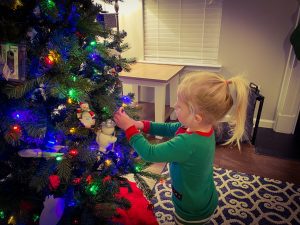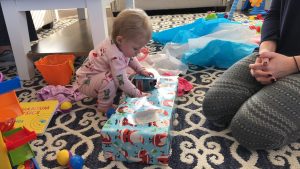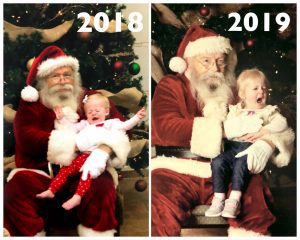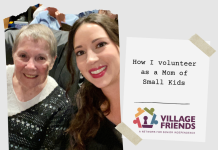I never believed in Santa Claus. My parents decided not to fully participate in that particular holiday tradition. My family watched all the fun holiday movies about Santa and classics like Rudolph the Red-Nosed Reindeer and Frosty the Snowman. My brothers and I put out milk and cookies on Christmas Eve and went to bed full of anticipation. We also woke our parents up at the butt crack of dawn to open presents (sorry, parents!). Most of our presents were marked “From Mom & Dad,” but a couple were labeled “From Santa” even though it was obviously all the same handwriting. I remember how much I loved Christmas and the entire season, but I never believed Santa was real. I knew my parents were the ones who ate the milk and cookies after we went to bed. I figured it was a well-deserved treat for them since they stayed up super late wrapping all the presents. Not believing that a fat, bearded man in a sleigh landed on our roof, slid down the chimney, and put presents under the tree did not negatively impact my childhood at all. At least I don’t think it did. I don’t know if Christmas would have held even more excitement for me if I’d thought that Santa and his elves and flying reindeer chilled out at the North Pole all year making toys to deliver once a year or if I’d have been devastated to believe all those things and then one day be told or figure out that it wasn’t true.

Our daughter turned three years old a couple of months ago. This will be the first Christmas that she’s able to understand what’s going on. We’ve already had the fun of Halloween with her dressed as Elsa and “trick or treating” — just at her great grandmother and great aunt’s apartment complex, because COVID, but still. She walked around saying “trick or treat” for several days after. Thanksgiving was also more of an outdoor “dine and dash” situation, so she didn’t really get the full experience. We’re going to try our hardest to make Christmas feel special this year. I actually can’t remember the last time I’ve had this much fun preparing and shopping for Christmas, and I know it’s in large part because my daughter is old enough to get excited about holidays and open/appreciate presents.

But mingled with my excitement is a bit of anxiety because it’s time to decide how we want to handle the Santa situation as a family. Our daughter is old enough to start believing, so I figure we have three options.
- The Full Santa Experience: We talk about Santa as though he were real, label some of her presents as being from Santa, set out treats for Santa and his reindeer, get an Elf on the Shelf (If I’m in charge of it, it would be the laziest loafer east of the Mississippi, but my husband might have some fun with it), take the kids to see Santa at various places (post-COVID), write letters to Santa, the whole shebang. If we go this route though, Santa will bring gifts like books and art supplies, not bicycles and Barbie Dream Houses. I don’t ever want to be the reason that another child wonders if Santa doesn’t love him or her as much as other kids.
- Mostly Ignore Santa: IF Santa comes up, we talk about him the way we talk about Mickey Mouse or Elsa, as a character in movies and shows but not as the person who really brings gifts. We don’t label her presents as being from Santa or set out cookies or write letters. We tell her the truth — that Santa is a fun symbol at Christmas time, but he’s not the reason we celebrate Christmas or the main focus of it. We also tell her that a lot of children believe Santa Claus is real and ask that she not disagree with them if they’d like to continue believing in him (and then hope and pray she listens to us and we don’t get an email from her teachers or angry parents…).
- Santa Lite: A middle ground that would involve making some decisions on the fly. We watch holiday movies and talk about Santa if she wants to, but don’t actively encourage her to believe he is real. We answer questions honestly if she asks. We participate in the fun traditions, but they are just that – traditions. We offer to set out treats for Santa, help her write letters to him, and visit him to take pictures. We may even label some presents as from Santa the way my parents and in-laws did. In my husband’s family, “Santa presents” were surprises that the kids didn’t ask for or didn’t think they would get. We’d basically leave it up to her. If she wanted to pretend that Santa is real, that’s entirely up to her, but we would always tell her the truth.
Honestly, I’m struggling with this decision. I don’t like the idea of teaching my kids to believe in something that isn’t real. It feels like lying, and not the “we don’t have any more ice cream” or “your princess dress is dirty so you need to pick something else to wear to school today” kind of lie. It feels bigger than that. But at the same time, I don’t want to deprive my children of fun Christmas traditions, and I certainly don’t want to have the kid who is intentionally spoiling it for their unsuspecting classmates at school. I also know that children believe all sorts of things that aren’t true. I don’t make a habit of telling my daughter “the truth” every time she decides she’s a puppy that day and crawls around and barks at me for a few hours. I let her play pretend and join in all the time without feeling bad about it (“Would the puppy like peanut butter or hummus for lunch today?”).

Regardless of what we choose to do about Santa Claus, our focus will remain on the real reason for Christmas – the birth of Jesus. We will explain that we give each other gifts to celebrate God’s gift of his Son, Jesus, to all of humankind. But I’d like to hear your strategies for Santa Claus and the related Christmas traditions. What did you do or are you doing with your kids?











